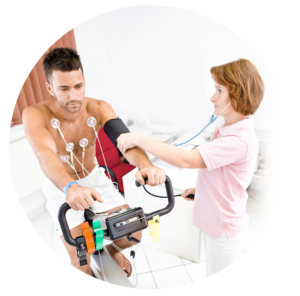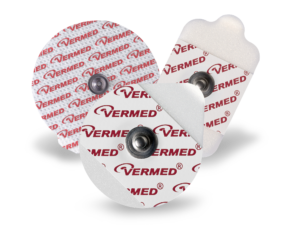Understanding Stress Test Electrodes
by Samantha Tilkins
A stress test is a commonly used diagnostic tool to assess how well your heart functions under physical exertion. The test typically involves physical activity, such as walking on a treadmill or riding a stationary bike, and helps determine if your heart is getting enough blood, if your symptoms can be reproduced with activity, and how your heart compares to others your age and sex. It also provides insight into potential issues with valves, blood supply, or electrical stability.

Stress Test Basics
During a stress test, healthcare providers monitor several vital signs: heart rate, blood pressure, oxygen levels, and ECG data. These measurements help evaluate how your heart responds to increased activity. Electrodes are placed on the skin to capture the heart’s electrical signals. These are connected to a computer that tracks your heart rhythm throughout the test.
The Challenge of Motion
Sweating, muscle movement, and shifting during exercise all introduce the risk of motion artifacts, which are unwanted electrical noises that can distort ECG readings. This can interfere with accurate diagnoses and may even lead to the need for repeat testing.
Design Matters: What Makes a Good Electrode for Stress Tests
Stress test electrodes must be engineered to stay put and provide a clear signal, even in high-motion environments. Key features include:
Strong adhesives: Maintain secure contact even during heavy sweating.
Gel: Wet gel electrodes help reduce impedance and improve signal clarity.
Skin-friendly materials: Hypoallergenic and disposable, minimizing skin irritation and risk of cross-contamination.
Proper skin prep, including cleaning or shaving the area before placement, helps reduce impedance and optimize signal quality.
Which Electrodes Should I Use For Stress Testing?
 Nissha Medical Technologies’ PerformancePlus™ electrodes are designed specifically for high-performance diagnostic use. Here’s why they work especially well for stress tests:
Nissha Medical Technologies’ PerformancePlus™ electrodes are designed specifically for high-performance diagnostic use. Here’s why they work especially well for stress tests:
High chloride, Ag/AgCl wet gel: Hydrates skin and produces fast, clear tracings
Aggressive adhesive: Stays in place, even through motion and sweat
Variety of materials and packaging: Foam, tape, or cloth options in shapes that suit your clinical needs
Why It Matters
Choosing the right electrode is critical to capturing accurate ECG signals. In high-motion testing scenarios like stress tests, high-quality electrodes help eliminate signal noise, reduce the risk of repeat procedures, and support confident clinical decisions.
For additional context on how ECG monitoring supports cardiovascular health more broadly, you can learn about on the role of ECG monitoring in preventing cardiovascular issues.
Looking to stock up or learn more about our products? Contact our sales team.
